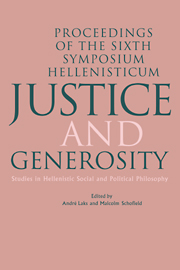 Justice and Generosity
Justice and Generosity Introduction
Published online by Cambridge University Press: 15 October 2009
Summary
‘Live unknown’, said the Epicureans, enjoining abstinence from politics. The Stoics, by contrast, believed that the wise man should go into public life if the circumstances were right, but held notoriously utopian and in the end depoliticized conceptions of the good community. Neither school debated the merits of oligarchy and democracy or tried to work out detailed prescriptions for the best constitution. These intellectual postures have sometimes been seen as appropriate and indeed inevitable responses to the decline of the polis in the age of the Hellenistic kingdoms: no polis, no political philosophy.
There is of course a grain of truth in this conventional picture of political thought — or its absence — in the Hellenistic period. But the present volume tells a more nuanced and complex story. One reason is that it reflects theorizing undertaken from a Roman perspective. Rome was the greatest of the Mediterranean cities of the time, and Rome was not a monarchy but an independent republic governed according to a distinctive constitutional structure which invited analysis along broadly Aristotelian lines. The principal surviving analyses, albeit fragmentarily preserved, come from the pens of Polybius, writing in the mid-second century BC, and Cicero, a hundred years later. Chapters 1 and 2 discuss the way in which these two authors draw on a wide range of Greek intellectual models to devise accounts of constitutional development (ch. 1) and of the moral and intellectual requirements the statesman — conceived as the magistrate of a republic — must satisfy (ch. 2), which are then applied to the case of Rome.
- Type
- Chapter
- Information
- Justice and GenerosityStudies in Hellenistic Social and Political Philosophy - Proceedings of the Sixth Symposium Hellenisticum, pp. 1 - 4Publisher: Cambridge University PressPrint publication year: 1995


